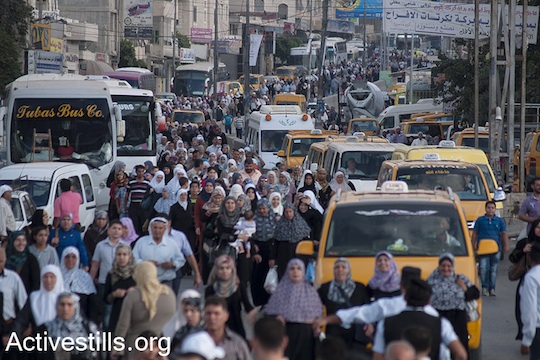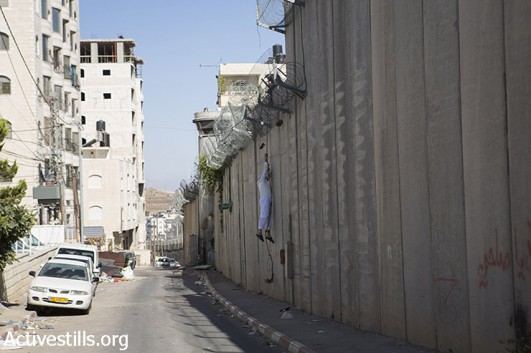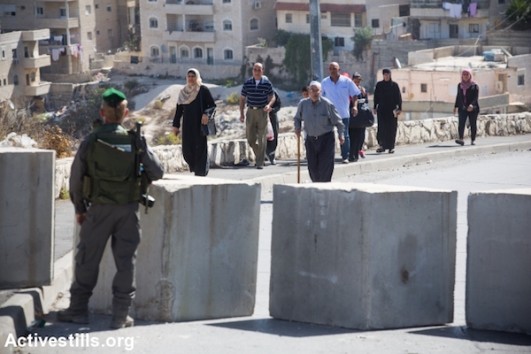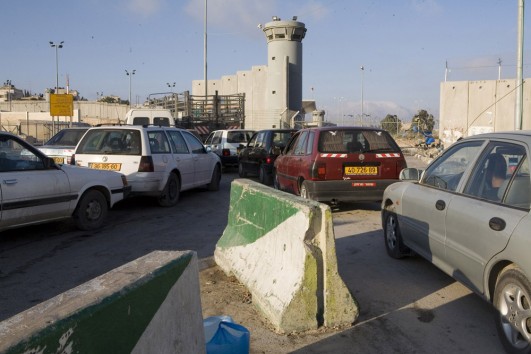Two taxi rides gave a small glimpse into some of the daily realities of Jerusalem’s Palestinian residents — ordinary people forced to live in unordinary circumstances.

“These houses were once neighbors,” says Naseem, a Palestinian taxi driver, as we drive through the neighborhood of Beit Hanina in East Jerusalem. He points to the separation wall to our right, jammed between homes that were mere meters away from each other. “These people are even from the same families. Now they have to walk or drive around the wall and through a checkpoint, just so they can visit one another.”
Naseem, who is in his early 50’s, speaks with a soft voice and a relaxed demeanor as he drives me from Jerusalem’s central bus station to Ramallah. I would normally use the regular public buses, but an attack on Qalandiya checkpoint just a few days before has me wary of running into trouble or going through more tedious security checks.
I give Naseem the name of the street where my meeting was located, but he has never heard of it. I call my colleague in Ramallah to ask for directions, she tells us the hotel nearest to the building. “Ah of course!” laughs Naseem. Palestinians generally don’t navigate their towns by street names (if they had any); instead we ask for the closest neighborhoods, landmarks, or family homes. “These street names in Ramallah are all new,” he says. “They name them after this country or that donor or that historical person. I don’t know if anyone even uses them to get around.”
Naseem lives in the Old City of Jerusalem with his wife and six children. His family is poor, and with a high rent and daily expenses, he says it is hard to make ends meet. He doesn’t mind his job – “I like having a simple life,” he says – so long as he can support his kids and help them enter higher professions. His eldest daughter just began her pharmacy studies at university.

I ask Naseem how life has been for him in the city during the past few months. Since October, Jerusalem has been the epicenter of violence both from Palestinian knife and car attacks against Israelis, and from the Israeli security forces’ crackdowns and closures on Palestinian residents and neighborhoods. Naseem gives me the same answer I always hear from Palestinians in the city: “Hiya se’ib (it’s difficult).”
Naseem says the tensions in the city are being felt every day – “like something is choking and dragging you by the throat” – and it is only getting worse. He doesn’t like politics, but in his city, politics are inescapable. “I just want an ordinary life, with a regular job and time to raise my kids without trouble. But the city doesn’t give you that.” He gestures back to the wall splitting Beit Hanina’s homes. “I don’t understand what the Israelis think they are achieving with all this. They’re fighting ordinary people who want to live ordinary lives. And everything about this city forces us to be unordinary.”
As we pass Beit Hanina on the way to Qalandiya, I tell Naseem I cannot imagine how people who see the separation wall every day cope with it. Naseem shrugs, his voice still calm: “We get used to it. We don’t accept it, but we find our ways to deal with it.”
***

A few hours later, I am picked up by a different taxi driver, Samir, to take me from Ramallah back to Jerusalem. Samir is from the Jerusalem neighborhood of Wadi Joz. He’s in his 30’s, more energetic in his talk than Naseem, but with the same relaxed posture in his seat.
Samir informs me that there had been an attack near Damascus Gate – a 19-year-old border policewoman was killed and others injured. Fearing that the authorities could be more aggressive at Qalandiya, Samir thinks it better to go through the road to the town of Hizma. He’s wrong; we arrive at the one-way road to find it completely congested. “Ya Allah,” he mutters, and quickly puts the car in reverse, gesturing to oncoming cars to turn back.
We return to Qalandiya and, as expected, the line of cars there is also packed. Seeing an opening, however, Samir makes a U-turn to cut in – causing the driver behind us to honk furiously. When the traffic freezes again, Samir steps out of the car to apologize to the other driver. He comes back with a guilty expression: “The guy was stuck on the road to Hizma for nearly an hour. He had just made it to Qalandiya before we cut in front of him.” He felt bad, but forced himself to forget about it. “It’s hard to not be selfish when it comes to checkpoints. You’re just desperate for it to finish as quickly as possible.”
Several minutes pass and we have only moved about 10 meters. But Samir isn’t too bothered. As we slowly make our way forward, he spots several people amidst the cluster of cars around us: a cousin, a former classmate, a fellow cab driver, an old friend. They smile and wave from their cars, asking about their families and cracking jokes. I tell Samir I find it amusing that the checkpoint had become a kind of meeting place. “It really is!” he replies. “The neighborhoods on this side are still part of our daily lives and our daily work. The wall makes it harder of course, but our connections haven’t been lost. We’ll always find someone to say hi to at the checkpoint.”

Another few minutes pass and we almost reach the soldiers guarding the checkpoint. Samir and I start discussing the subject of resilience, and again I express bafflement as to how Palestinians in Jerusalem can cope with their circumstances. Samir agrees that it’s a form of strength, using an unusual analogy to put it into a simplified context.
“Say you live in a house with another person. One day, that person suddenly brings a cow into your room. Bear with me a minute,” he says as I laugh at his example. “You’re shocked by what the housemate does and ask what on earth he is thinking. But the housemate doesn’t reply to you. A month later, he brings another cow into your room, and another one a month later, and so on. Soon there are so many cows that you don’t even remember what it’s like to live without them. Now all you want is just for there to be fewer cows in your room.
“So the housemate removes a cow, then another one, and maybe another one after that. You still have a few cows in your room; but you’re just happy that there are fewer than before. You live with this for as long as you can. But one day, you will remember that you could actually have something better – that you don’t have to live like this. Then, I suppose you crack. And God help you both when that happens.”
I thought about it and told him it was one of the best explanations of the Palestinian experience I had ever heard. Samir smiled and reached for the glove compartment to pull out an apple for a snack, along with his ID card to show to the young Israeli soldier waiting to inspect us.


